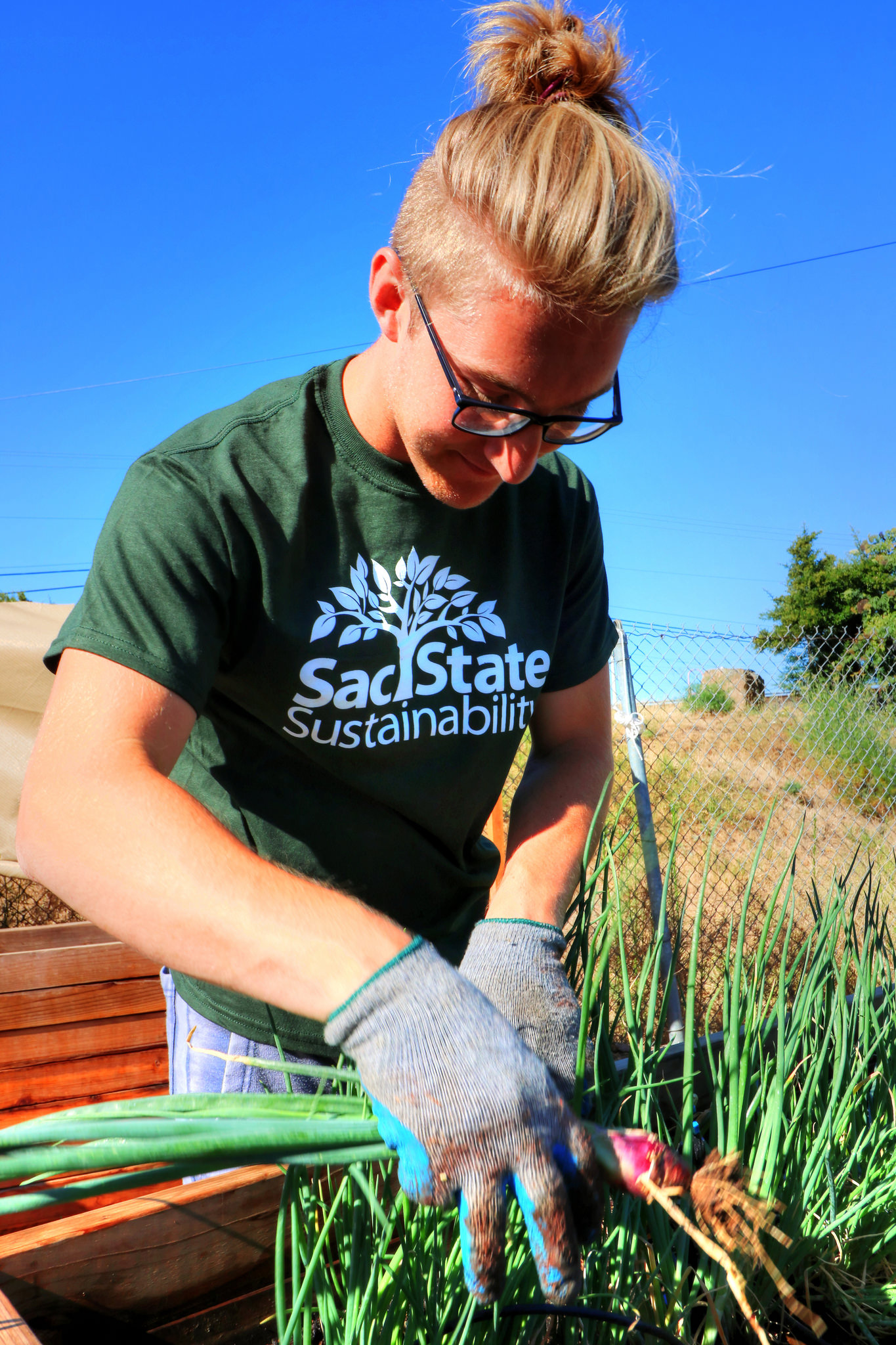 The BAC Yard, which has provided hands-on experience while operating on a shoestring, is looking to bounce back from a devastating burglary. (Sacramento State/Jessica Vernone)
The BAC Yard, which has provided hands-on experience while operating on a shoestring, is looking to bounce back from a devastating burglary. (Sacramento State/Jessica Vernone)Sacramento State’s fledgling Bioconversion and Agricultural Collaborative, known as the BAC Yard, is a labor of love for Sac State Sustainability and the students in Professor Kelly Thompson’s Food Production & Sustainability class, in the Department of Family & Consumer Sciences (FACS).
The program was dealt a major blow May 9 when thieves broke into the facility’s locked storage shed, stealing hand tools, a rolling toolbox, electric saws, extension cords, pop-up tents, and solar equipment. The loss totals more than $2,000, representing a significant hit to the enterprise.
The thieves also made off with a hydroponics system water pump, which was the final project for two graduating FACS students who had planned to leave their tiered hydroponics system at FACS, so other students could grow fresh herbs in the classroom.
“They also stole a solar inverter and all of the wiring for a solar-powered aquaponics system that was supposed to be used this week by student teachers training to educate schoolchildren about aquaponics and composting,” says Ryan Todd, the University’s sustainability manager. “They even stole the BAC Yard sign.”
There is no money to replace the stolen items.
Students who showed up the morning after the break-in discovered that all of their weeding tools had been taken, so they borrowed some from the campus grounds crew.
Fortunately, the BAC Yard’s resident honeybees and their hives were unharmed, and the thieves left behind the protective bee suits. Crops mostly growing in raised beds – including tomatoes, zucchini, beans, bell peppers, broccoli, beets, carrots, and hops – were untouched and are thriving.
The BAC Yard is a mini farm in a onetime empty lot south of Hornet Stadium. There, students raise fruits and vegetables for the Associated Students, Inc. (ASI), Pop-Up Pantry, which provides free fresh produce to hundreds of Sac State students experiencing food insecurity. BAC Yard bounty also was served to nearly 200 guests last fall at Sac State’s Farm-to-Fork Dinner on the Guy West Bridge.
The facility is the heart of Sacramento State’s ambitious recycling program. Campus grass clippings and fallen leaves from 3,500 trees are delivered to the BAC Yard, along with food scraps from River Front Center, Epicure Restaurant, and the Courtyard Market. There the material is composted with methods including student-proposed vermicomposting, which uses earthworms to turn the organic waste into high-quality compost for campus trees and flowerbeds.
With this recycling program, Sac State no longer pays thousands of dollars annually for waste hauling and the cost of purchasing compost.
The BAC Yard was created in 2016 with an $80,000 “Campus as a Living Lab” (CALL) grant from the California State University (CSU). The bulk of the funding went to acquire electricity and running water for the remote lot.
Sac State Sustainability won the 2016 best practice award at the CSU Facilities Management conference and the recent outstanding environmental leadership award from the Sacramento Environmental Commission for its work at the BAC Yard.
The facility serves as a laboratory for more than 30 FACS students every semester. They learn about composting, food production, honey bees, and how sustainability impacts their career path and everyday life. It’s also a hands-on teaching space for Sac State Sustainability student interns, student assistants and volunteers, and the space hosts hundreds of visiting K-12 students every year.
“Most of the students who come to learn at the BAC Yard had no idea how to compost, grow food, or even use a power drill,” Todd says. “By the end of their time there, they have a greater understanding of sustainability and have gained valuable life skills that they can take with them after college.
“And it’s where Sac State students can get creative and build projects that help them understand sustainability and improve our campus.”
Since the CALL grant money ran out last month, the BAC Yard has operated on a shoestring. The produce was started from 10-cent packages of seeds, and students nurtured the seedlings in the BAC Yard’s hoop house.
Todd hopes to make the facility self-sustaining by selling seedlings, certified organic compost (vermicompost is priced at about $40 a cubic yard), and Hornet Honey from the facility’s honeybees.
“The BAC Yard isn’t just about growing plants or composting. It’s our most tangible link to students from kindergarten through college, to give them the opportunity to learn, and to do,” says Joey Martinez, Sac State’s recycling coordinator.
“It’s one of our most direct pathways into the community. Compost from our BAC Yard can be found in school and church gardens throughout Sacramento, and our produce is helping to keep bellies full.
"The BAC Yard is more than just a learning place, it’s a place where people come together."
Sac State Sustainability has created a crowdfunding account to help recoup the BAC Yard’s losses and improve security. – Dixie Reid
